人教版新目标初中英语九年级下册Have you packed yet说课稿7篇
-
- 页数:41页
- 字数:约 46737 字
- 大小:192.00KB
- 格式:.doc
- 版本:Office2016及以上版本
- 作者:雨森设计
Have you packed yet说课稿7篇
Have you packed yet?第一课时 说课稿
1. 教材分析
1.本教材的地位及作用:
本单元围绕“Preparingforavacation”话题开展一系列教学活动.首先通过询问和谈论度假前的准备工作,引出并学习带有already和yet的现在完成时态.在此基础上,让学生谈论自己和他人已做和未做的事,进一步熟练运用目标语言。教材中提供的所有活动都以现在完成时态为中心,通过一系列的听、说、读、写的训练,来加深对现在完成时态的理解,明白英汉两种在结构及表达方法的一些异同点。从而提高他们运用所学语言的综合能力。

2.教学目标(知识目标、能力目标、情感目标)
1)知识目标:
重点词汇--- bathingsuit, water, travel, guidebook, beach towel, street map
语言目标---Have youwatered the plants yet?
Yes, I have already watered them.
2)能力目标:训练学生运用所学知识进行听、说、读、写的综合能力。
3)情感目标:引导学生学会自理。培养学生学习英语的强烈兴趣,意识到合作学习的重要性。
3.重点和难点:
学会制作旅行所需物品清单;了解外出旅游前的各种准备工作。现在完成时态。
2、说学生
目前班级学生人数过多,教学时间又有限,教师不可能照顾到每一个学生,而且课后与学生沟通的时间也不多,情感联系由此而减弱,这不仅使少数学生的心理需求困惑难以得到满足,而且他们也会感到被老师们冷落,长时间下去,这些学生的学习积极性就消失了,因此影响课堂气氛,使课堂教学不能得到有效的进行,这就导致教师的教学、学生的学习和成长都极为不利。因此就出现了同一个老师面对同一个班的学生教同样的内容,有的学生成绩优秀,有的学生出现学困;有的学生喜欢英语,而有的学生讨厌英语,甚至提及英语就头疼,造成学生个体差异明显,后进生面大。
因此我想到了分层教学。根据学生的成绩、学生的潜力、学生的学习态度三方面因素把学生分为A、B、C三个层次。A层次是学习成绩、学习自觉性、主动性各方面较优秀的学生。B层次是有一定基础,学习自觉性、主动性不强,但潜力较大的学生。C层次为学习成绩较不理想,其他各方面都较差的学生。当然,这种层次的划分也不是一成不变的,利用竞争机制,根据测验成绩,允许学生层次位置有所变化。
3、说教法
《新课标》明确指出:教师应该避免使用单纯传授语言知识的教学方法,尽量采用“任务型”的教学途径。在任务型教学过程中,教师既是任务的设计者,又是任务的组织者。面对不同层次组成的班级,要想大面积提高教学质量,必须贯彻因材施教的原则。这要求教师在设计任务时应具有阶梯性,形成由初级任务到高级任务和由高级任务涵盖初级任务的循环。使每一学生都能为之,各有提高,让每个学生都能获得求知的满足与成功的体验,激发其学习兴趣,从而达到教学的最终目的。
4.说流程
这是本单元的第一课时,内容是Section A 的1a—2a。我将采取五部分即五个教学任务进行授课。
Task 1 导入。找一名同学在黑板上写1至20的数字,问学生问题“Has he written the number 1 yet?”“Yes, he hasalready written the number 1”“Has he written the number 50 yet?.”” No, he hasn’t written thenumber 50 yet.”通过这样的对话练习,学习含有already 和yet的现在完成时。
Task 2 旅游风向标:调查本组成员外出旅游时通常随身携带的物品。学生两人一组开展此项活动,讨论到海滩度假时随身携带哪三件物品,到城市旅游时随身携带哪三件物品。在调查过程中,学生不仅扩展了旅行方面的词汇,而且学会了做物品陈列清单,培养了一定的生活能力。
教师分层布置任务并提出具体要求:
1)学生分三大组(以层次为分组单位)讨论。通过询问获取信息。各组选一人做记录,向全班汇报。
2)教师把各组记录收集在一起,抽取任意一份,请B 层小组的同学用句子把上述物品的价格表达出来。
3)然而教师请C层小组学生复述句子,A层小组学生把句子串成一篇短文。
Task 3 放心出游:让学生列出他们在外出旅行前作的准备工作,并在课堂上通过各小组活动交流各自的信息,作出简单的报告。
教师分层布置任务并提出具体要求:
1)用头脑风暴的形式让所有学生说出外出旅游前要做的一些准备。可以开展组与组之间的竞赛。看谁说得多。如:lock the widows, buy a street map, feed the pets,turn off the computer and so on.
2)C层小组的同学在头脑风暴的同时,在笔记本上做记录为下一步活动做铺垫。
3)将学生分成四人一组,调查各自家庭在外出前的准备工作及分工情况。
4)请A层同学把以上结果写成小短文,作出简单的报告。
Task 4听力练习(1b 和2a)
根据听力材料,每个对话都将设计五个由易到难的问题:
如:1b 对话的五个问题1) Have youpacked the beach towels yet??
2) Can’t Judy packthem?
3) Couldthe boy water the plants?
4) Who willget the street map ?
5) Have theboy packed the camera?
根据材料内容及问题的提出,本人进行了具体的任务设计
A层: 1) 听懂并理解对话内容。(一遍)2) 快速准确地完成提出的问题。3) 就对话内容互相提问和回答。4) 复述对话。
B层: 1) 基本听懂对话、把握对话大意。(一遍)2) 能独立完成提出的问题。3) 大致能重复或模仿对话中的关键句。
C层: 1) 参照对话完成听力,了解对话大意。(两遍)2) 在老师的提示下完成提出的问题。
通过分类完成听力训练,为所有学生提供了语言实践的机会。让他们了解了自己的听力、理解水平,从而激发了他们下次提高听力的愿望。
Task 5 布置作业:
为了体现面向全体学生,我将作业布置为三种:
A组同学针对Task3放心出游写一篇关于自己家人的短文;
B组同学模仿1b 作一个对话;
C组同学将所学语言点及新单词背诵下来。
Have you packed yet? 第一课时说课稿二
一.教材分析
本单元的核心教学项目为“运用现在完成时来谈论最近已发生的事情”,这是本单元的第一课时,主要任务为通过听、说的教学,使学生能够运用所学的目标语言,谈论或询问最近已经发生的事情。
二.教学目标
1.知识目标:
(1)words and expressions
bathing suit, towel, suitcase, water (v.), guidebook,refrigerator, clean out, garage.
(2)key sentences
Have you watered the plants yet ? --- Yes, I have alreadywatered them.
Have you packed the beach towels yet ? --- No, I haven’t. /Notyet.
2.能力目标
(1)Enable students to understand and talk aboutrecent events and the chores people have to do before a vacation.
(2)Enable students to understand how to use thetwo words “already and yet”.
(3)能听懂听力内容,并能完成相应的练习。
3.情感目标:
培养学生做事要有条理,养成“今日事,今日毕”的好习惯。
教学重点:The Present Perfect Tense.
教学难点:Talk about recent events by using target language.
三.教学方法
教法是完成教学任务和目的的方法手段,是决定教学效果的重要因素。在教学过程中我按照复习、导入新课、操练、归纳和巩固练习五步教学发法与多媒体展示相结合的方法授课,并穿插对话、小组调查等活动。其素材来源于现实生活,内容朴实,形式多变。
1.采用多媒体教学
多媒体技术有利于把许多抽象的问题具体化和形象化。图文并茂地为学生展现不能直接观察到的事物,有效地激发学生的学习兴趣,使学生产生强烈的学习欲望。国外实验学家通过大量的实验证明:人类获取的信息83%来自视觉,11%来自听觉,两者加起来就有94%。还有3.5%来自嗅觉,1.5%来自触觉,1%来自味觉。多媒体技术即能看得见,又能听得见。这样,通过多种感官的刺激所获取的信息量比单一地听老师讲课强得多。
2.采用情景教学法进行对话
在课堂上创设适当的情景,根据所听到的信息进行俩俩对话或用所学知识进行小组调查,让学生进行口语训练,设制贴近生活话题。这样既可以消除学生紧张的心理,又培养了学生的语言表达能力。即所谓“生活是最好的老师”。
四、学习方法
“兴趣是最好的老师”。教学是教与学的双边活动的过程。教师的“教”是建立在学生的“学”的基础上的。根据中学生思想活跃、喜爱活动的心理特点,在本课中我为学生设计了对话、小组活动等,可以使学生在活动中寻找兴趣,在兴趣中享受学习的欢乐,从中更加热爱学习。
五、教学程序
se sentences (现在完成时句子). Step1. Greetings.
Step2. Presentation and practice.
(1) present the words and sentence patterns.
“bathing suit. towel. water(v.).guidebook.”
Have you watered the plants yet ? ---Yes, I have already watered them.
Have you packed the beach towels yet ? ---No, I haven’t. /Not yet.
(2)Look at the picture in the screen.(1b).
a. listen and check the chores the people have done.
b. make conversations in pairs according to the informations in 1b.
(3)Look at the picture in the screen (2a).
a. Listen. Who said each thing ? Write “M”(for Mark) or “T”(for Tina).
b. role play a conversation between Mark and Tina.
Step3. Groupwork.
1. do a survey in your group. Complete the chart.
2. tell your classmates by using “have / has done” sentence patterns.
finished homework
watered the plants
fed the dog
cleaned your room
washed your clothes
turned off the lights
locked the door
Step4. Summery.
Have a brief summery about the sentence patterns.
“ have/has +done” 用来谈论最近发生的事情。
“already 用于现在完成时的肯定句中,yet 用于现在完成时的否定句和疑问句中 ”
Step5.Exx.
1. I have already bought a dictionary.(变为否定句)
I ______ ______ a dictionary ______.
2. He has already watered the flowers.(改为一般疑问句)
______ he ______ the flowers ______ ?
3.Jack’s never made dumplings, ______ ______ ?(完成反意疑问句)
4.I’ll do it in a minute.(对划线部分提问)
______ ______ will you do it ?
5.They have cleaned out the refrigerator. (对划线部分提问)
______ have they ______ ?
Step6. Homework.
Try to talk about recent events by using the Present Perfect Ten
Have you packed yet? 第二课时说课稿
1.学科名称
Have you packed yet?(九年级上学期)
2.所在班级情况,学生特点分析
所教两班现有学生102人,总体来看,这两个班的学生存在两级分化,处于中间位置的学生不多,成绩提升不是很明显。班上的部分男生还没有形成良好的学习习惯,平时放松自己,各方面表现要相对落后。基础较差但要求上进的学生也不多,占20%,他们上课能积极发言,认真完成作业,态度好,但缺乏一定的学习方法及缺少学习毅力,在某种程度上还是不能够严格要求自己。拔尖学生占10%,能严格要求自己,能自学。基础较差,不思进取,无心学习的学生,占20%左右。但好的一方面是已临近毕业,大部分学生都能够认识到他们的目标,能在学习上肯下功夫
3.教学内容分析
本单元是以现在完成时为主要学习内容。首先引导学生明确本单元学习目标,整体把握课文,掌握重点和难点。并要求学生在复习旧知识的基础上,进一步学习新知识,提高听说和课文阅读能力。通过欣赏有关名胜古迹的相应图片引导学生把握本文以|"Have you packed yet"为中心话题选材,组材的特点,分析现在完成时态的结构及用法,理解课文的主旨。课堂教学应以听说、诵读法、小组活动贯穿始终,让学生活学活用,并进行应有的思考,全面提教学效率。
本单元以Preparing for a vacation 为话题,共设计了四个部分的内容:
Section A部分有4个模块:第一模块围绕Have you packed the beach towels yet?这一话题展开口语(1a, 1c)、听力(1b)训练;第二模块围绕Talking about recent events进行听力(2a-2b)、口语(2c)训练;第三模块继续就Talking about different chores这一话题展开口语(3b)和阅读(3a)训练;第四模块仍就The things you have to do this week进行列表并展开小组及个人活动 (4)。
Section B部分有4个模块:第一模块就Talking about a band展开口语训练;第二模块围绕Talking about members of a band进行听力(2a-2b)、口语(2c)训练;第三模块继续围绕Talking about a band进行阅读(3a)和写作(3b, 3c)训练;第四模块拓展为采访训练 (4)。
Self Check部分有2个模块:第一模块对所学词汇进行填空训练(1);第二模块就本单元的中心话题进行对话阅读和写作训练(2)。
Reading部分共设置了5项任务:第一项任务以问题讨论的方式激活学生相关背景知识;第二项任务要求学生通过快速阅读获取信息;第三项任务要求学生通过讨论、写作等形式加深对阅读内容的理解;第四项任务要求学生能运用所学知识解决实际问题;第五项任务要求学生能运用所学知识展开实践活动。
4.教学目标
1. Knowledge Objects
(1) Key Vocabulary
chop, wood, light, village, well, farm
(2) Target Language
Have you bought a newspaper?
Yes, I’ve already bought a newspaper.
2. Ability Objects
(1) Train students integrating skills.
(2) Train the ability of expressing studentsownopinions.
3. Moral Objects
We should make a plan for our everyday activities and make aschedule. It can remind us how to spend the time. It is good for our study and life.
5.教学难点分析
1.现在完成进行时(Present Perfect Progressing
Tense)由have/has+been+动词的现在分词(即动词的ing形式)构成,表示动作从过去的某个时刻开始,继续到现在,可能继续下午,也可能刚刚结束。
例如:
I’ve been writing letters for an hour (and I’ve still got somemore to
do).
I’ve been sitting in the garden (and have just come indoors).
上述第一例说明动作还将继续下去,第二例说明动作在说话时刻之前刚刚结束。
2.现在完成进行时与现在完成时(Present Perfect Tense)有时可以互相交换使用,含义没有什么差别。
例如:
We’ve been living here for ten years.
We’ve lived here for ten years.
这两句话都表示“我们已经在这里居住了十年了”。
6.教学课时
Period 1 (Section A: 1a,1b, 1c, 2a, 2b, 2c) New function presenting
Period 2 (Section A; 3a, 3b, Section; B: 1, 2a, 2b, 2c 3a, 3b, 3c,4)Practice
Period 3 (Self Check: 1,2; Section 4) Self Check
Period 4 (Reading:Section 1- Section 3) Reading
7.教学过程
Have you packed yet?
TheSecond Period
Ⅰ. Teaching Aims and Demands
1. Knowledge Objects
(1) Key Vocabulary
refrigerator, garage,suitcase, clean out, put in, turn off
(2) Target Language
Have you watered theplants yet?
No, I haven’t.
Have you packed thecamera yet?
Yes. I’ve already put it in my suitcase.
Have you fed the cat?
No. I haven’t fed her yet.
2. Ability Object
(1) Train students listening ability.
(2) Train students speaking ability.
3. Moral Object
We must be ready with our work before we do it.
Ⅱ. Teaching Key Points
1. Key Vocabulary
clean out, put in, turn off
2. Target Language
Have you watered the plants yet?
No, I haven’t.
Have you packed the camera yet?
Yes. I’ve already put it in my suitcase.
Have you fed the cat?
No. I haven’t fed her yet.
3. Structures
Have you packed the camera yet?
Yes. I’ve already put it in my suitcase.
Have you fed the cat?
No. I haven’t fed her yet.
Ⅲ. Teaching Difficult Points
1. the target language
2. How to train students listening ability.
Ⅳ. Teaching Methods
1. Listening method to improve the students listening ability.
2. Pairwork to make every student work in class.
Ⅴ. Teaching Aids
1. A tape recorder
2. The blackboard
Ⅵ. Teaching Procedures
Step I Revision
Check homework. Get some pairs to read theirconversations. Collect their conversations and help students correct anymistakes.
Step Ⅱ 2a
This activity provides guided listening practice using thetarget language.
Look at the picture. Ask, What can you see in the picture? (A boy and a girl are in the kitchen. They both look a little stressed out)
Go through the instructions with the class. You will hear a boy and a girl talkingabout getting ready to go on vacation. Write M after each thing that Marksays and T after each thing that Tina says.
Look at the sample answer. Say, Tina said, No. I haven’t cleaned out the refrigeratoryet. Get students to repeat No. I haven’t cleaned out the refrigeratoryet.
Play the recording for students the first time. This time students only listen to therecording. Play the recording a second time. This time let students write Min frontof Mark’s statements, and T in front of Tina’s statements.
Check the answers with the class.
Answers
1. T 2. T 3. M 4. T 5. M 6. T
Tape script
Boy: Mom and Dad said they want to leave in ten minutes. Are you ready, Tina?
Girl: No. I haven’t cleaned out the refrigeratoryet. I have to do that right now.
Boy: Tina! You’re unbelievable. What about your bike?
Girl: I’ve already put it in the garage. But I haven’t locked the garage yet.
That’s your job, Mark.
Boy: I know. I’ve already done most of my jobs. I’ve taken out the trash.
Girl: Have you fed the cat yet?
Boy: Not yet. I’ll do it in a minute. Have you turned off your radio?
Girl: Yes, I have. I think we’re almost ready.
Step Ⅲ 2b
This activity provides guided listening practice using thetarget language.
Go through the instructions with the class. Look at the list of questions withblanks in front of each one. Then look back at the statements inActivity 2a.
Say, Some of the statements in Activity 2a are answers toquestions in Activity 2b. Write the number of the correct answerfrom Activity 2a in front of each question in Activity 2b.
Get several students to read the questions in Activity 2b tothe class. Look at the sample answer. Ask a student to read the question andanswer to the class.
Are you ready, Tina?
No, I haven’t cleaned out the refrigerator yet.
Play the recording for students. Let students write their answers inthe blanks. Play the recording again if necessary.
Correct the answers.
Answers
Have you fed the cat yet? 5
What about you bike? 2
Are you ready, Tina? 1
Have you turned off your radio? 6
Step Ⅳ 2c
This activity provides guided oral practice using the targetlanguage. Look at the sample conversation in the speech bubbles. Invite a pair of students to read itto the class.
SA: Are you ready, Tina?
SB: No. I haven’t cleaned out the refrigeratoryet.
Go through the instructions with the class. Say, With your partner make aconversation using information from Activities 2a and 2b. Have students work in pairs. While they are working, walk aroundthe classroom checking the progress of the pairs and offering help as needed.
Invite two pairs to say their conversations to the class.
Conversation 1
SA: Have you fed the cat yet?
SB: Not yet. I’ll do it in a minute.
Conversation 2
SA: Have you turned off your radio?
SB: Yes, I have.
Step Ⅴ Grammar Focus
Look at the grammar focus box. Get three students to read thequestions and answers to the class.
Have you watered the plants yet?
No, I haven’t.
Have you packed the camera yet?
Yes. I’ve already put it in my suitcase.
Have you fed the cat?
No. I haven’t fed her yet.
Let students make up other sentences in pairs using haveyou…yet questions. For example: Have you had lunch yet? Have another studentanswer truthfully: Yes, I have or Yes, I have already had lunch, or No, Ihaven’t had lunch yet.
Pay attention to the use of already and yet. Say, When we use the words have andalready, we are talking about something that happened in the past, but not along time ago. When we use the words haven’t and yet, we are talking aboutsomething that will happen in the future, but not a long time from now. It will happen soon. For example: I’ve already hadbreakfast, but I haven’t had lunch yet.
Draw a simple diagram to help students understand the grammarfocus.
Get some pairs to say their sentences aloud to the class.
A sample sentence
I’ve already had lunch, but I haven’t had supper yet.
Culture note
Many Americans are used to taking at least one vacation trip ayear. But in China, some of the students may not be in the habit oftaking an annual vacation, or even making a trip to another city. For some students, financiallimitations and family obligations make such travel impossible. For others, it may be that takingtrips is not something that is common in their home culture.
Step Ⅵ Summary
In this class, we’ve learned key vocabulary clean out, put in,turn off and the target
language Have you watered the plants yet? No, I haven’t. Have you packed the camera yet? Yes,I’ve already put it in my suitcase. Have you fed the cat? No. I haven’t fed her yet.
Step Ⅶ Homework
Get students to write some sentences according to the targetlanguage.
Step Ⅷ Blackboard Design
Have you packed yet?
Section A
The Second Period
Target language
A: Have you watered the plants yet?
B: No, I haven’t.
A: Have you packed the camera yet?
B: Yes, I’ve already put it in my suitcase.
A: Have you fed the cat?
B: No. I haven’t fed her yet.
8.课堂练习
Choose the right answer.
1.( )----Has Jim seen this film ___?
----Yes, he has ___ seenit.
A. yet; already B. already; yet C. already; ever
2.( )---- ___ you written to your father?
---- No, I havent.
A. Did B. Are C. Have
3.( ) Has he ___ to the park yet?
A. go B. went C. gone
4.( ) ----Have you ___ a newspaper?
----Yes, I ___ a newspaper this morning.
A. buy; bought B. buy; buy C. bought; bought
5.( )----What a nice dog! How long have you had it?
---- ___ two years.
A. For B. Since C. In
6.( )----When did you borrow the English story-book?
----I borrowed it last week. I ___ it for a week.
A. have bought B. have kept C. have borrowed
9.作业安排
1. Finish off the exercises on pages 57~58 of the workbook.
2. Get students to talk about the things they have done and theyhaven’t done yet this week in pairs.
10.附录(教学资料及资源)
(1)Reading Tasks
He’s already visited the place where his ancestors lived.
根据课本第116-117页的短文完成下列表格,每空词数不限。
In Search of
Roots summer
camp program
Time to start
1980
Organizer
(1)of
Guangdong Province
Time the
summer
camp lasts
(2)
Purpose of
the program
To give young
overseas Chinese
the chance to learn
more about
themselves
Overseas Chinese
students
Ages
Between (3)
years old
Activities
They study (4) , see the big changes
and visit interesting
sights, but the most
exciting part of
the trip is (5) .
Reading Tasks
1. The local government 2. Two weeks
3. 16 and 254. Chinese culture
5. going to their ancestors’ village
(2)典型例题
1. I have already fed the dog.(变为一般疑问句)
Have you fed the dog yet?
解析:像陈述旬里的some,already之类,在一般疑问句的舞台上往往化作相应的any,yet(yet还须置句末)。
2.—1 have seen the film Titanic already.
一When_______ you________ it?
A.have;seenB.will;seemC.did;seeD.did;seen
解析:询问动作发生的具体时间应用一般过去时,故答案应选C。
3. So far,we_______ lots of English words.
A.will learnB.are learningC.has learntD.have learn
解析:此题的关键是明白so far的意义,因为它强调的是到目前为止的时间,包括现在。而现在完成时的一种用法就是过去的动作一直持续到现在,因而答案是D。
(3)单元练习
I.根据释义写出本单元学过的单词
1. r ______ : a room for storing food at a low temperature
2. g _______: a building or indoor space in which to park orkeep motor vehicle(交通工具)
3. a _______: to come before the public
4. m_______: great in number, size or extent
5. s ______: look over carefully in order to find something,explore
6. c_______: to join or fasten together
7. h ______: a writer, student or scholar of history
8. h_______: ones native land
9. s_______: a usually rectangular piece of luggage forcarrying clothing
10. a_______ : something done or to be done, business
II.句型转换
1. He waters the plants often.(用already改写)
He_______ _______ ________the plants.
2. I have already cleaned the refrigerator.(变为一般疑问句)
_______ you_______ the refrigerator______?
3. Mr. Li began to teach English in this school in 1999.(同义句转换)
Mr. Li_______ ________ English in this school since 1999.
4. Our monitor has been a League member for two years.(同义句转换)
Our monitor________ the League two years ago.
5. 一Have you packed the camera yet?(肯定回答)
—Yes, I________ _______________ it in my suitcase.
6. My grandpa had to collect water from the village well. (改为反意疑问句)
My grandpa had to collect water from the village well,_______________?
7. They can hardly believe it. (改为反意疑问句)
They can hardly believe it,_______ _______?
8. He spent hours cleaning out the refrigerator. (同义句转换)
He_________ hours_________ _________ out the refrigerator.
III.用所给动词的适当形式填空
1.__________ Jim ________ (finish)doing his homework yet?
2. Oh, I______ (leave) my bag on the bus. What shall I do?
3. I have_______ (be) with my friends for a year.
4.He________ already_______ (buy) a newspaper.
5.In the last twelve months, New Ocean Waves________ (have)three major concerts.
6.________ you _________ (write) a poem?
Yes, I have. I_______some last year.
7.They spent half an hour_______ (pack) their bags.
8. Do I need _________ (clean) my room?
9. Many tourists________ deeply________. (move) by hisbehavior.
10. So far, it_________ _________ (bring)thousands of overseaChinese students to China to explore the roots of their families.
IV.完形填空
After she did a lot of shopping, Mrs. Smith came out of theshop and started to walk to the bus stop. Her bag was so1that she had to restfor a few minutes. She stopped2a new, bright ear. It was just at the side ofthe road. As she stood there, she saw a policeman3 towards her. "Excuse me, madam,"said the policeman. "Can you4that sign over there?"
"Yes, I can,” said Mrs. Smith. "It5‘No parking’."
"Yes, madam. So why have you parked your car here? Ishall6to give you a parking ticket. "
"But this isnt my car, ” said Mrs. Smith.
"Isnt it?" said the policeman, and his face turned7 . "Im very 8 .Still I have to put a ticket on the front of9 ear. "But he was not able to finishwriting the ticket because10 woman hadarrived. She kissed the policeman and said, "Hello, dear. I knew I could11 you here at this time of the day. Happybirthday! I have got a12 for you. Ihave13 you your birthday present. "
"Thank you, dear, "said the policeman. "But 14 isit? "His wife pointed at the red car. "Here it is," she said."But you15leave it on this road for very long. Theres No Parking signover there. "
1. A. beautiful B. expensive C. heavy D. important
2. A. in B. By C. On D. under
3. A. coming B. come C. comes D. came
4. A. tell B. believe C. look D. read
5. A. was B. says C. spoke D. wrote
6. A. ask B. decide C. love D. have
7. A. red B. left C. right D. back
8. A. angry B. happy C. glad D. sorry
9. A. my B. your C. the D. her
10. A. a B. another C. other D. the other
11. A. catch B. find C. get D. look for
12. A. ticket B. cake C. thief D. surprise
13. A. sent B. taken C. given D. brought
14. A. how B. where C. what D. which
15. A. neednt B. mustnt C. wont D. shant
V.阅读理解
One day, Mrs. King askedLucy to go shopping for her.
"Here is a shoppinglist, so you wont forget anything," she said.
"OK, Mum]"saidLucy. When she got to the shop, she picked up all the things on the list.
"I haventforgotten anything , "she said to herself. But then it was time to pay forthem.
"Oh, sorry!"she said to the shopkeeper. "Ive forgotten my money! Well, Ill keep the things on this shelf foryou," said the shopkeeper.
Lucy ran home at once.Her mother saw her when she arrived.
"That was quick!"she said. "Have you finished yet?"
"No, Mum,"said Lucy. "I forgot the money!"
"Well, you shouldtake the shopping basket with you, too! "said Mother.
In the shop, Lucy gotall the things on her shopping list, and took them home. When she reached home,her mother asked:
"Have you goteverything?"
"Yes, Mom,"said Lucy. "I havent forgotten anything. "
She quickly put thebasket on the table. She was taking things out of the basket when she dropped abag of sweets. The bag fell on the floor and broke open. The sweets went every-where! "Oh, my dear !"she said.
"Bad luck ! "said Mother. "It doesnt matter!"
They both started to pick them up.
"How much did you pay for all these things? "askedher mother.
"Not too much," said Lucy. "I didnt spent allthe money. I brought some back. "
"Where is it?" asked the mother.
"Here it is, Mum! Thats one thing I havent forgottentoday!"
1What did Mrs. King give Lucy before she went shopping?
2Why did the girl have to run home?
3What her mother tell her to take?
4Did Lucy get everything at last?
5What happened when she was taking the things out of thebasket?
6Do you often forget anything? Do you have any good ideas toimprove your memory?
VI.书面表达
根据图画内容及所给英文提示,写一段100词左右的短文
①school library, Miss Gao, librarian,borrow…from, but, not lend, others;
②two books, at a time, keep, two weeks,not finish, to renew;
③many magazines and newspaper, not takeout of, keep quiet
参考答案
I. 1. refrigerator2. garage 3. appear4. major5. search
6. connect7. historian8.homeland 9. suitcase10. affair
II. 1. has already watered2. Have: cleaned; yet3. has taught 4.joined
5. have; already packed6. didnt he7. can they8. took; to clean
III. 1. Has; finished 2.have left3. been4. has; bought 5. hashad
6. Have; written;wrote7. packing 8. to clean9. were; moved 10. has brought
IV. 1~5 CBADB 6~10 DADCB11 ~ 15 BDDBB
V. 1. A shopping list.
2. Because she hasforgotten to bring the money.
3. A shopping basket.
4. Yes, she did.
5. She dropped a bag ofsweets on the floor and it broke open.
6.略
VI. This is our school library. Miss Gao is a librarian. MissGao told us, "You may borrow two books at a time and keep them for twoweeks, but not lend them to others. If you cant finish them on time, you mustgo to the library to renew them. "There are many magazines and newspapersin the reading room, too, but we cant take them out. Miss Gao told us to keepquiet while we are passing along outside the library.
11.自我问答
上完这节课后,经过认真的反思,我认为在提高学生阅读能力上下功夫,应该教给学生一些有用的阅读方法及技巧,并让他们多练习,逐步把这种方法及技巧转变为学生的个人能力,使他们能够从英语阅读活动中享受到乐趣。我们每个教者需要平时多注意对学生学习方法的指导,学习策略的培养,采用灵活多样的方法,激发学生学习英语的兴趣。
Have you packed yet? Section A 说课稿
各位评委:大家好,今天我说课的题目是初中英语人教版九年级unit14. Have you packed yet?本课的中心话题是为旅游做准备。通过为旅游做准备,使自己养成勤于思考,善于总结的好习惯。整个说课我将分成五个大部分进行讲述:即教材分析、教学方法、学习方法、教学环节的设计、教学程序。
一、教材分析
(一)教材的地位和作用
《新目标》(Go For It)是人教社出版的课程标准系列教材之一的英语教材,它采用任务型语言教学模式,融汇话题,交际功能和语言结构,形成了一套循序渐近的生活化的学习程序。每个单元都列出明确的语言目标,主要的功能项目与语法结构,需要掌握的基本词汇,幷分为A、B两部分。A部分是基本的语言内容,B部分是知识的扩展和综合的语言运用。
我说课的内容是A部分基本的语言内容和文化知识。主要是通过Preparing for a vacation引起话题,要求学生能够谈论自己最近已发生的事情。
(二)教学目标的确立和依据
为了完成正常的教学任务,还要有效地培养学生的创新精神和实践能力,我确立如下的教学目标:
1.知识目标:
A:掌握词汇:watered, travel guidebook, beach towel, bathing suit, refrigerator,cleaned out ,turned off
B:掌握句型:Have you packed the camera yet? Yes ,I have already packed the camera .
2.能力目标:
A:学会谈论已经完成和还未完成的事情。
B:学会使用already和yet,并能在实际情境中简单的运用,培养学生应用英语进行交际的能力。
3.情感目标:
通过对本课的学习,增强实际交际能力,开阔眼界。
(三)重点和难点:
1.重点:基本单词,词汇和句型。
2.难点:能够运用现在完成时谈论自己的已经完成和还未完成的事情。
二、教学方法
(1).情境教学法 通过动画导入新课。
(2).听说教学法 通过听录音,模仿对话来巩固句型。加强听说训练。
(3).任务教学法 通过Pairwork,Roleplay 强化所学的知识。
(4).采用多媒体课件,增大教学容量和增强直观性 。
三、学法指导
一个差的老师只会奉献而好的老师则会交给学生,发现真理的方法。中国有句古话“受人以鱼,不如授人以渔”,学习也是这样,要教学生学会学习,才是每一个从教者的目标。本单元是口语会话课,以讨论法引导学生在自主学习重点单词与语法的基础上鼓励他们合作、探究、小组活动等。注重学生的口语实践和学习体验,不求面面俱到,但求积极参与,独特体验。
四、教学环节的设计
学生具有无限的潜力,我们常说“没有学不好的学生,只有教不好的老师”。因此,在教学中需要教师适时适当的引导,本节课中我尤其侧重训练学生通过合作、探究来获取知识的过程,并注重改变学生以往的学习方法,通过设计有效地例句来引导学生,使他们始终处于主动寻求知识的渴望。我充分放手让学生发挥其主体地位,使其真正成为课堂的主人。本节课我讲解的时间不超过15分钟,让学生有充分的30分钟进行会话,以达到了解、掌握本单元的重点的目的,课前我给学生布置了预习作业,让他们查找有关国家、城市的相关图片或资料,使学生在预习中就掌握了大量的信息,具备了相应的选择能力和重组能力,这也恰恰是新课程标准的要求。
五、教学程序
Step1.Warm-up/Revision
ΠGreetings and free talk.
Revision: Show students some pictures.
A: Have you ever been to …?
B: …
Grammar is so important that it should always be learned and made use of in class. We’ve learnt “present perfect”.
1、现在完成时的概念:现在完成时表示过去发生或已经完成的某一动作对现在造成的影响或结果;也可表示过去已经开始,持续到现在的动作或状态,这种动作或状态还有可能继续持续下去。
2、现在完成时的构成方式:
其肯定句形式:主语+ have (has) +过去分词;
其否定句形式:主语+ have (has) +not+过去分词
其一般疑问句形式:Have (Has)+主语+过去分词
Step2.引入新课
Œ引起话题:老师要求一个学生为大家唱首歌,在他唱之前,老师问:
T: Has he sung a song yet?
引导学生回答:
S: No, he hasn’t sung a song yet.
等学生唱完歌后,老师再问:
T: Has he sung a song yet?
引导学生回答:
S: Yes, he has already sung a song.
再让几个学生表演不同的动作,如:play basketball, clean the blackboard, dance,
Ž学生自己归纳already和yet
老师补充:
already用在现在完成时的肯定句中, yet用在否定句或一般疑问句中,放在句子的末尾。
Step3.Brain storm
If you want to go on a beach vacation, a city vacation. What do you want to pack? Choose the most important three things. Then write down.
A: What do you want to pack?
B: I want to pack...
Maybe they will use these words as following: bathing suit, beach towel, camera, sunglasses, hat, slippers,camera, guidebook, street map, money
Teach the new words and then check the answers.
Step4.Presentation/Practice
ŒShow a picture of a person who is packing.
T: Now we’re going to the beach for a vacation. Are you ready? We will leave in ten minutes. Have you done the things you must do when you go out in the outside? Let’s check your job.
Are you sure you have already done most of your jobs for your vacation? Have you packed yet?
A: Have you packed the camera yet?
B: Yes, I have already packed it.
No, I haven’t packed yet.
No yet.
Practice the conversation and learn the new words and phrases.
A: Have you packed …yet?
B: Yes, I have already packed it.
No, I haven’t packed yet.
packed the beach towels
turned off the power
locked the door
closed the window
cleaned out the refrigerator(fridge)
put the car in the garage
brought some medicine/enough money
bought a travel guidebook/a street map
fed the dogs
watered the plants
done the chores
Step5.Work on 1b (listening)
Show the picture of 1b.
Work on 1b.
Check the answers: packed the camera
watered the plants
bought a travel guidebook
Step6.Work on 2a and 2b (listening)
ΠWork on 2a.
Get the students to understand the situation first and then listen and check.
v Work on 2b. Listen again and match the questions with answers.
w Listen and imitate.
Step7.Role play
ŒRole play
You are going to leave for a travel in 10 minutes. Are you ready? Now check the chores you have already done or you haven’t done yet.
Make a conversation just like that in 2a and 2b.
学生自由组合,分配家人角色,掌握句型,强化口语.
↘Homework
1. 抄写并背诵单词water bathing suit bathing suit towel guidebook clean out refrigerator garage suitcase并预习单词P112和抄写Grammar Focus两次.
2. 背诵2a.
3. 完Unit 14作业本中相应练习.
4. Search some materials about traveling from Internet, newspaper or other books.
把以往所学现在完成时的知识重新巩固。
此句呈现在屏幕上,already和yet用红色标注。
学生在具体语境中识记already和yet在现在完成时中的用法
教师可提供相应的词汇供学生两人一组操练该句型。教师四处走动。捕捉信息,及时指导。
出门旅游应该注意什么?真实的生活情景的呈现使学生体会英语与日常生活极贴近,从而可以增强学生学英语的兴趣,同时可以很自然地用already和yet来表达各个句子,让学生领悟他们在表达上的区别,能更好的掌握现在完成时的用法。
两人一组进行问答,熟练句型,强化口语
全班核对答案,给予点拨。
在听力中很重要的一个环节是听并模仿,惟妙惟肖地模仿情景中的音语调和语速,学一口纯正的英语。
当堂运用所学句型进行真实的交际,并获取了同学的一些生活中的信息。(此步骤可根据学生水平和课堂容量可增可减,也可移到下个课时进行,看学生情况)
Have you packed yet? SectionA 3a 3b 4 说课稿
一说教材
(一)教材的地位及作用
新目标英语教材概述
今天我说课的内容是新目标九年级unit14 Section A3a 3b 4。《新目标英语》教材的语言教育理念是:知识用于行动强调“语言应用”,培养“创新、实践能力”,发展“学习策略”。它采用任务型语言教学(Task-basedLanguage Teaching)模式,融汇话题,交际功能和语言结构,形成了一套循序渐进的生活化的学习程序。教材中每单元都设计一个或几个与该单元话题有关的任务,让学生在完成任务过程中,使用英语获取信息,用英语进行交流,培养运用英语解决实际问题的能力。
单元分析及教材的处理
本单元主要以Preparing for avacation 为中心话题,围绕着描述“一系列已经完成和还需要完成的事情”展开,进一步学习和运用有关现在完成时态,让学生学会谈论已经完成的事情。本课是Section A第二课时,其要主目标是“Talk about recentevents. Things that have been done and haven’t been done.能够运用现在完成时来询问最近已经发生或还未发生的事,并且能够运用现在完成时来谈论自己或他人已做或未做的事。例如:“Have you packedthe camera yet?” “I’ve alreadybought a newspaper.”同时还要掌握其肯定及否定回答,是本课的语言目标。
本节课为Section A的第而二课时,主要学习内容是:阅读一封e-mail :讲述我要做和已做的事情与爷爷年幼时要做的事.尝试了解祖辈幼时生活的辛苦,另一方面也考虑一下统筹安排时间.对他人已完成和未完成的事进行询问,并做出肯定和否定回答。由于前面已有现在完成时的基础,我想趁热打铁,继续这个话题,就把教材的顺序做了调整,倒过来上。
(二)教学目标
根据课标及14单元的内容,我将本节课的教学目标细化为以下五方面:语言目标,能力目标,情感和态度目标,策略目标及认知目标。
1 语言目标:(1) 能够运用现在完成时来询问最近已经发生或还未发生的事,如:Have you done your homework?
(2) 能够运用现在完成时来谈论最近已经发生或还未发生的事,如:I’ve already bought a newspaper. Ihaven’t done any of those things yet.
2 知识目标:掌握本课的重点词汇和句型,如: get back to, chop wood, light the fire, farm ,anyway , village well
I haven’t done any of those things yet. Have you bought a newspaper? Yes. I’vealready bought a newspaper?
3能力目标 能够读懂重要句型及语言结构,并能够仿照例子学会调查并进行调查报告总结。
4 情感目标 .
懂得倾听他人,尊重他人
通过组织小组调查和讨论,培养人际交往能力和团队合作精神.
通过游戏激发学生的学习积极性.
通过讨论如何安排家务与学习任务,明白统筹安排时间的重要性,并体会祖辈过去生活的艰辛.
5策略目标通过Survey和游戏培养交际能力.
6认知目标通过多种形式的活动,提高对事物的分析、判断能力以及综合运用英语的能力。
(三)教学重点及难点
教学重点:
1:词汇:get back to, chopwood, light the fire, farm ,anyway , village well ;chores to do ; water the plants; feed the animals,etc
您可能喜欢的文档
查看更多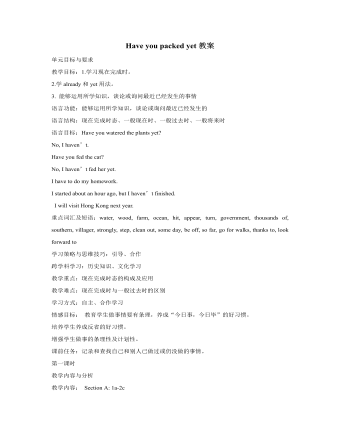
人教版新目标初中英语九年级下册Have you packed yet教案
- 页数:24页
- |大小:103.00KB
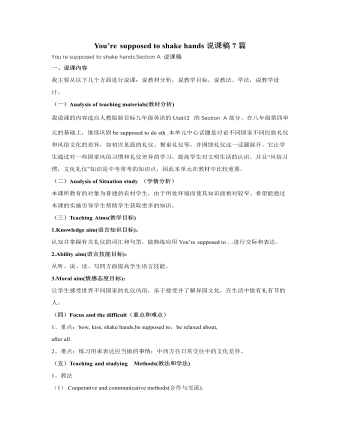
人教版新目标初中英语九年级下册You’re supposed to shake hands说课稿7篇
- 页数:20页
- |大小:107.00KB
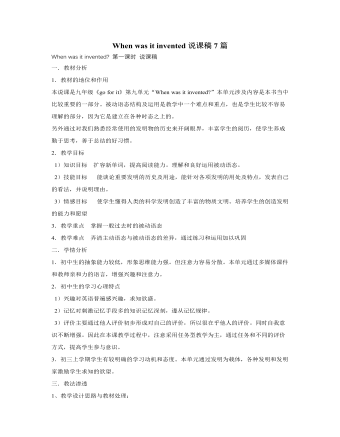
人教版新目标初中英语九年级下册When was it invented说课稿7篇
- 页数:26页
- |大小:113.00KB
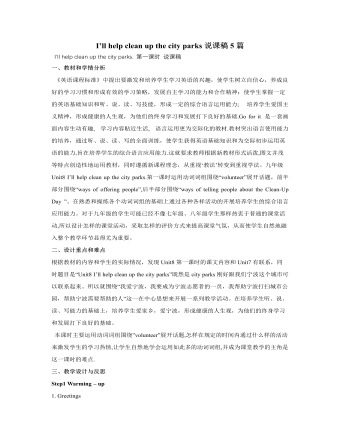
人教版新目标初中英语九年级下册I’ll help clean up the city parks说课稿5篇
- 页数:17页
- |大小:95.50KB
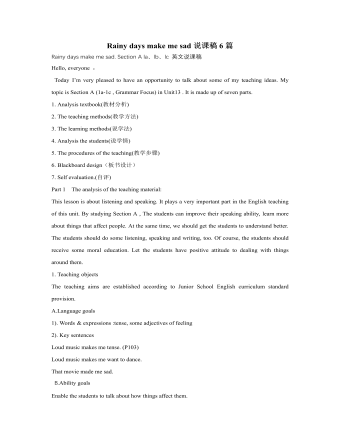
人教版新目标初中英语九年级下册Rainy days make me sad说课稿6篇
- 页数:21页
- |大小:113.00KB
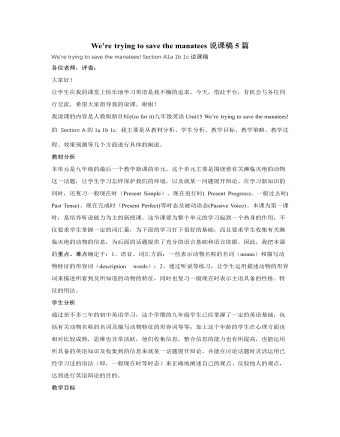
人教版新目标初中英语九年级下册We’re trying to save the manatees说课稿5篇
- 页数:29页
- |大小:154.50KB
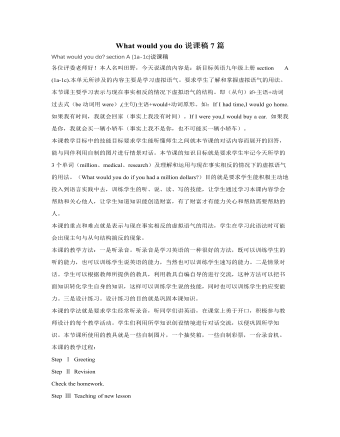
人教版新目标初中英语九年级上册What would you do说课稿7篇
- 页数:43页
- |大小:204.00KB
热门说课稿
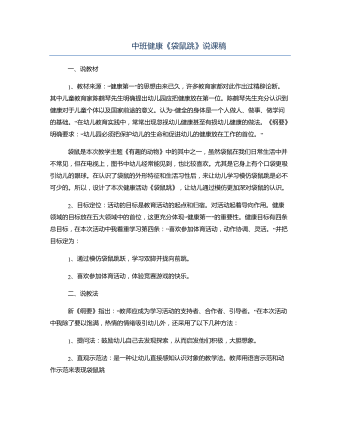
中班健康《袋鼠跳》说课稿
- 页数:2页
- |大小:34.88KB
- 说课稿
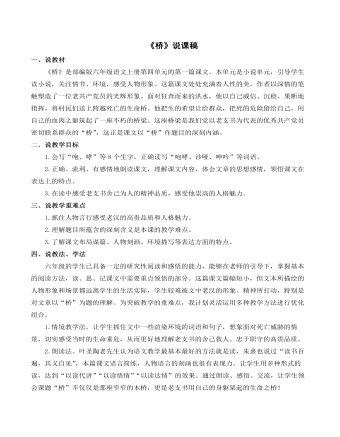
《桥》说课稿
- 页数:5页
- |大小:42.50KB
- 说课稿
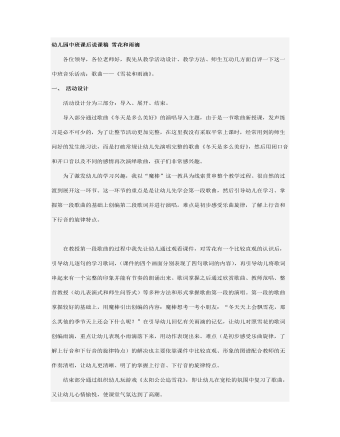
幼儿园中班课后说课稿 雪花和雨滴
- 页数:3页
- |大小:37.00KB
- 说课稿
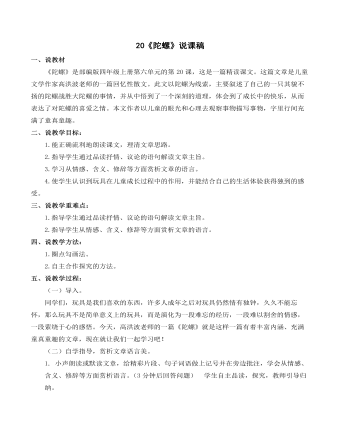
《陀螺》说课稿
- 页数:4页
- |大小:39.00KB
- 说课稿
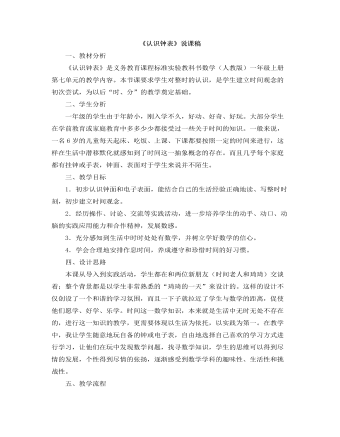
小学数学人教版一年级上册《认识钟表》说课稿
- 页数:4页
- |大小:24.27KB
- 说课稿
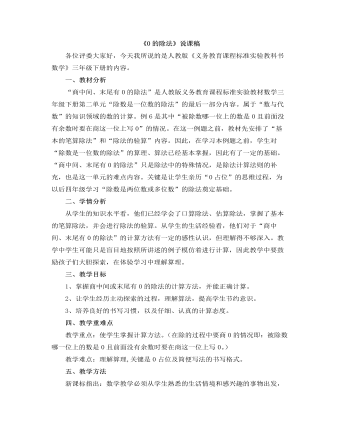
小学数学人教版三年级下册《0的除法》说课稿
- 页数:6页
- |大小:34.92KB
- 说课稿
今日更新

精选高中生期末评语
- 页数:42页
- |大小:7M
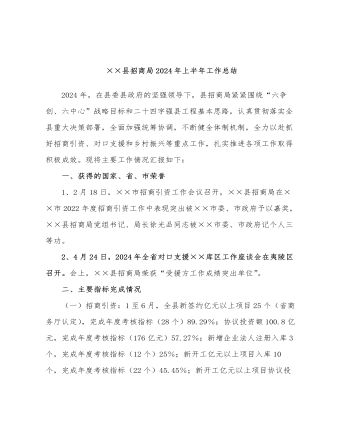
××县招商局2024年上半年工作总结
- 页数:12页
- |大小:142.54KB
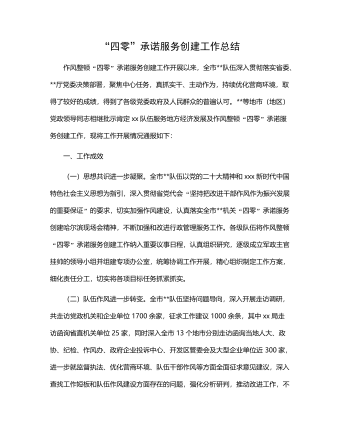
“四零”承诺服务创建工作总结
- 页数:5页
- |大小:39.83KB
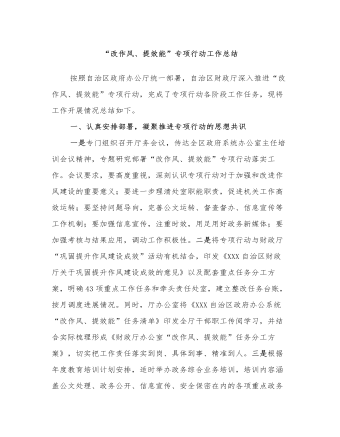
“改作风、提效能”专项行动工作总结
- 页数:6页
- |大小:139.05KB
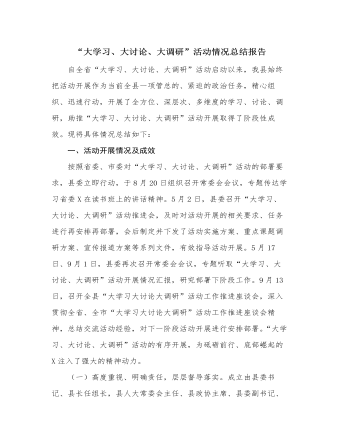
“大学习、大讨论、大调研”活动情况总结报告
- 页数:7页
- |大小:26.12KB
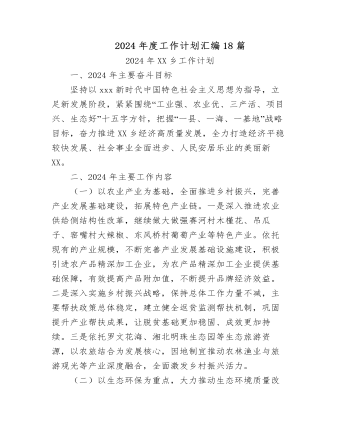
2024年度工作计划汇编(18篇)
- 页数:72页
- |大小:196.93KB





